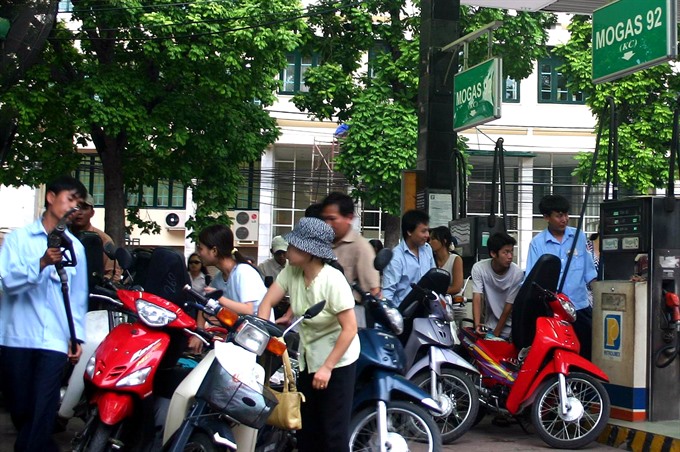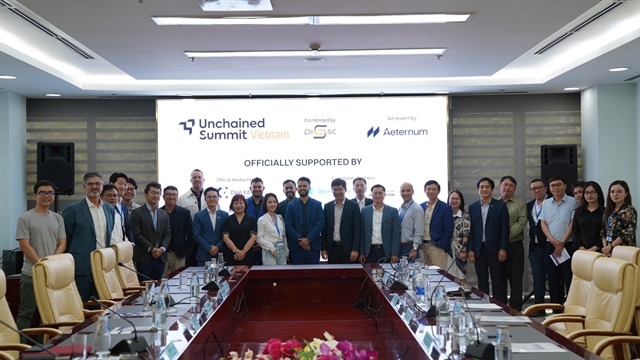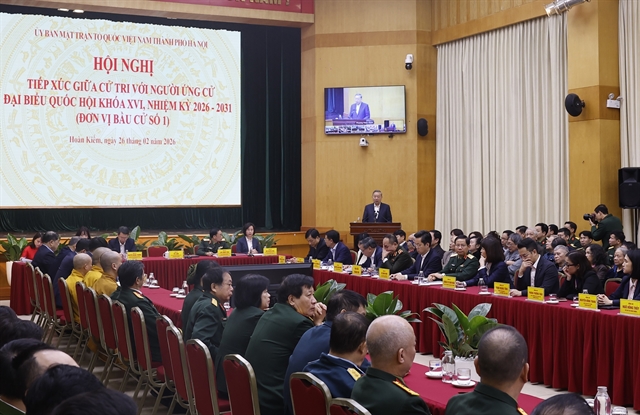 Society
Society

The Ministry of Finance is launching a plan to put a tax charge on anyone who buys petrol.
 |
| People queue at a gas station on Trần Hưng Đạo Street, Hà Nội. - VNS Photo Đoàn Tùng |
HÀ NỘI – The Ministry of Finance is launching a plan to put a tax charge on anyone who buys petrol.
The money will be paid into a fund that works to reduce pollution.
The ministries of Construction, Industry and Trade, Transport, Sciences and Technology, and Natural Resources and Environment have been asked for input to put the plan into action.
The proposal of collecting exhausted fume fee was a part of project on enhancing management to road vehicles and reducing pollution in 2017-20 period, and vision 2030.
According to the Ministry of Finance, the collection of the emission fee aims to reduce the amount of personal vehicles in inner city.
Hà Nội said the growth of personal vehicles was "alarming".
Without urgent management measures, traffic congestion and environmental pollution would become out of control.
It’s estimated that the capital city will have more than 843,000 cars and more than six million motorcycles by 2020. And by 2030, the number of cars will reach more than 1.9 million, while motorcycles are more than 7.5 million.
Hà Nội People’s Committee said the regulation on environmental pollution surcharges according to the level of exhaust gas by vehicles was an effective measure to limit the use of personal vehicles, especially old ones which exhausted high emission.
Vũ Văn Viện, Director of Hà Nội’s Department of Transport said that collection of exhausted fumes fee was reasonable to limiting personal vehicles.
However, the proposal of gas emission fee has raised concerns among experts.
They say the new fee would bring burdens to people and businesses while the current environment protection fee levied on petrol price would be up to ceiling rate by the start of next year.
They say the new fee levied on exhausted fume emission would lead to fee overlapping.
Economist Đinh Thế Hiển told Người Đưa Tin (The Courrier) newspaper: "From next year, the environment fee on petrol would increase up to ceiling rate. The collection of environment fee on gas emission would cause negative impact to the whole society".
"It meant goods prices would be raised and competitiveness of export businesses would be dropped because of burdening many kinds of taxes and fees. And people’s lives would be badly affected by increase of goods prices", Hiển said.
"In short, the fee on exhausted fume emission would negatively affect key labour forces including small-scale traders, transporting service workers in the society,” Hiển said.
“Collecting more fees might lead to inflation”, he added.
Sharing the same opinion, Dr. Ngô Trí Long, former director of Market and Price Research Institute (the Ministry of Finance), said currently, there have been several fees on environment protection.
Petrol businesses have to pay many kinds of taxes and fees such as importing tax, value added tax (VAT), environment tax, special-consumption tax, and business income tax, he said.
“If fees on exhausted fumes is collected, it is too many”, Long said.
And it is the people who would lose out, he added.
Bùi Danh Liên, vice president of Hà Nội Transport Association told Lao Động (Labour) Newspaper collecting fees from vehicles to the inner city was necessary.
This was considered a resort for reducing traffic congestion, he said.
“However, the matter was how to collect it? Whether to ensure the fairness among means of transport? And how to manage the collected money?” Danh said.
At present, vehicle users pay VNĐ3,000 (12 US cents) per litre of petrol as environment protection fee. And the rate will be VNĐ4,000 (17 US cent) next year, according to the vice president.
So, collecting fee on emissions to vehicles meant fee overlapping, he said.
Besides, for means of transport, cars for example, there are standards for exhausted fumes emitted to the environment, such as Euro 2 and Euro 1 standards.
Therefore collecting surcharge to exhausted fume emission must be based on emission standards of specific vehicles, Liêm said.
“In many countries, drawing out and implementing plans of collection gas emission fee took a long time. The work could not be done overnight”, he said. – VNS




